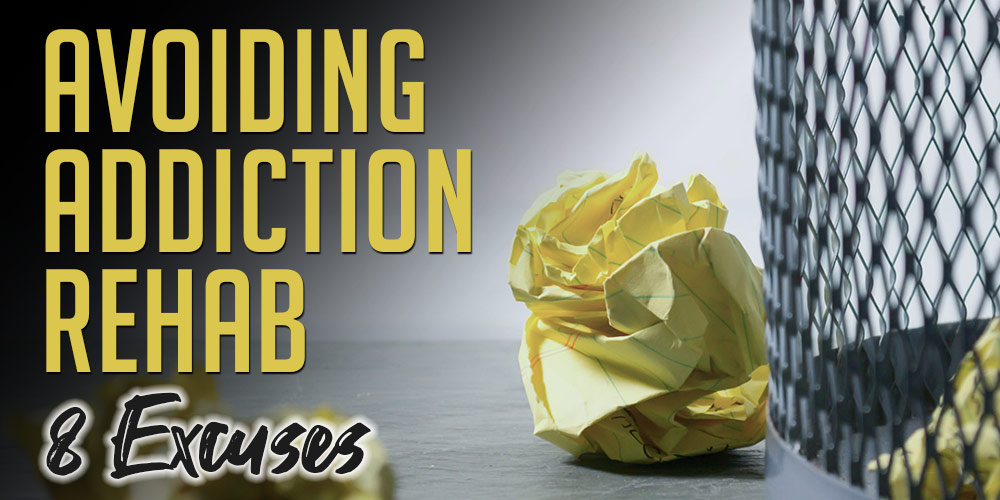
In case you haven’t heard all the excuses addicts use to avoid going to addiction rehab, we’ve outlined some of the most common ones here.
Anyone with sufficient time in recovery will tell you that it’s incredibly rewarding and life altering. But like anything else, it comes with challenges and struggles.
Understanding that and anticipating temporary hardships helps remove probably the biggest obstacle to recovery – the excuses people tell themselves for why they can’t go to addiction rehab and get the care and treatment they deserve.
The National Survey on Drug Use and Health (NSDH) estimates that around 20 million people in the U.S. battle a substance use disorder, but only 10 percent of them ever receive treatment of any kind.
In truth, there are a growing number of resources and treatment approaches that can accommodate almost anyone.
Overlooking the perceived roadblocks to treatment is the first step toward a healthier, happier life.

8 Common Excuses to Avoid Going to Addiction Rehab Treatment
1. I can give up alcohol or drugs on my own, without anyone’s help.
There’s a reason this excuse tops the list. Most people who have struggled with addiction have offered it up on many occasions. They may have even stopped for a period before falling back into the cycle of dependency and substance abuse.
The fact of the matter is, untreated addiction will continue to worsen a person’s mental and physical health even with bouts of self-forced sobriety or “cutting back” on booze and drugs.
Pretending a substance use disorder is no big deal will simply prolong and deepen poor health, and make recovery more difficult down the line.
Most people are very good at becoming addicted on their own, but terrible at recovering alone. Ask almost anyone in recovery how they did it and they will say with the help and support of many other people.
2. If I go to treatment, people will know I have a problem.
There’s a very good chance that friends and family already know when we have a problem with drugs and alcohol. Even if they don’t, those closest to us, who care about our wellbeing, only want what’s best for us.
Breaking the news to family members or friends is also a way to get ahead of any shame and embarrassment. Being honest and committing to recovery is empowering and a healthy start toward positive change.
Plus, many people may encourage the decision to get clean and sober and will provide a much needed support system during and after treatment.
3. You think I have a problem, look at how bad other people are.
A lot of people with a substance use disorder are surrounded by others worse off than them, and it’s often a convenient way for a person to think their personal behavior doesn’t rise to the level of addiction.
This excuse, like most of them, is rooted in denial. Our lives don’t have to be completely devastated before we get the treatment we need.
Continually comparing ourselves to others and avoiding rehab may actually lead to dire personal, professional, and economic consequences.
4. I’ll lose my job if I go into treatment.
There are, in fact, some protections against losing your job. Any company with 50 or more employees, as well as all public agencies, are required to comply with the Family Leave Act.
This law allows a person to take up to 12 weeks of unpaid time off for medical treatment, including treatment for addiction.
In addition, many people with a mental health or physical impairment that limits life activities are covered by the Americans with Disabilities Act (ADA).
Addiction combined with a mental health issue like depression could be covered under the ADA, and an employer will simply need a doctor’s note for a person to qualify.

5. I can’t afford addiction treatment and rehab.
The excuse of not being able to afford addiction treatment is powerful because the cost of medical care can be extremely prohibitive. In reality, though, there are often more affordable options for substance abuse treatment than people might realize.
Many treatment facilities offer payment plans, will work with patients and their insurance companies, and in some cases develop a treatment protocol that’s suited to an individual’s financial capabilities.
If an inpatient residential facility is too expensive, chances are good they also offer an outpatient program that isn’t as costly and will still be effective.
Most people only look at the initial cost of treatment instead of examining the long-term costs of addiction, and the toll it takes on a person’s overall health.
If a person drinks a $10 bottle of wine or vodka every day, that adds up to $3,650 a year and doesn’t include special occasions or bigger nights of drinking.
A professional or executive who eats and drinks out every night at a favorite restaurant or bar might average $40 a day over the course of a year. This nightly habit could be costing $14,600 a year and might be conservative for some people.
For each of these examples, adding a bag of weed, cocaine, or other substances to the mix every week can easily inflate these costs.
Over the course of a few years, the money saved from getting sober would more than pay for treatment and probably add years to a person’s life.
6. Where will I go after I get treatment if I lose the place I’m living at now?
This is a real concern, especially for people in a precarious financial situation. Fortunately, many treatment facilities help patients find transitional housing or sober living communities before they get out of treatment.
People concerned about housing who commit to treatment often find that they are in a much better living situation after getting the care and support they need.
It’s also not uncommon for people to live together after treatment and share expenses while they work on recovery together. Many lifelong friendships have formed from those who met in treatment.
7. Addiction Rehab doesn’t work because I’ve known people who went to treatment and they are not any better than before.
Addiction is a chronic disease and the rates of relapse are consistent with other chronic diseases like diabetes, asthma, and some cancers, according to the National Institute on Drug Abuse (NIDA).
Recovery from addiction can be challenging, as noted above, and sometimes relapse is a part of the “process.“ There are effective tools, like relapse prevention therapy, continued counseling, and support groups that can lessen the chances of relapse.
Every person is unique, and the reason one person has a problem with addiction might be completely different from someone else. Nobody can answer the question, “does rehab work,” until they experience it firsthand.
Those who truly commit to recovery and want to live a sober life are the ones who usually come out on top. Those who don’t have a commitment and desire to get sober are the ones who are most likely to fail.
8. I’m not hurting anyone else and it’s my life.
As easy as it is to believe this perspective, addiction is not a victimless disease and many other people get hurt just as much as the person with a drug or alcohol dependence.
The public faces danger from those who drive under the influence or who are chronically ill as a result of substance abuse.
When people are a threat to themselves, they can therefore also be a threat to others. And watching a family member or loved one fall deeper into a treatable disease is traumatic for everyone involved.
Whether it’s a child watching a parent, or a partner watching their loved one suffer, this kind of trauma negatively affects and diminishes the quality of life and wellbeing of those around you, as much, or more than it does for yourself.
Our actions and choices, whether that’s to continue suffering from addiction or making the effort to go to rehab and recover, affect those we respect, care about, and love.

Other Excuses for Not Going to Addiction Rehab
I already tried addiction rehab and it didn’t work for me.
Nobody said it would be easy, and relapse is a normal part of addiction. If the first time didn’t work, keep at it or try a different program.
I need drugs or alcohol to deal with my depression or PTSD.
No, you really don’t. A dual diagnosis program can help with both addiction and mental health issues, but they need to be treated at the same time. Overcoming one issue can solve both problems.
I haven’t hit rock bottom yet.
This is a really lame excuse for not going to rehab, and rock bottom should never be the measurement people use for getting sober. Some people never make it out of rock bottom and that becomes their final resting place.
Besides, it’s much easier to recover if it’s done sooner rather than later when things get too bad.
I’m not addicted to drugs or alcohol.
This is called “denial” and it’s in every addict’s playbook. Some people really don’t have an actual problem with alcohol or drugs and they get by just fine.
For those who can’t quit despite harmful consequences, are obsessed with the next time they can use, and plan their day around drinking or taking drugs, there’s a good chance they have an addiction.
It’s important to remember that addiction is a chronic, relapsing disease, and like any other chronic illness that people seek medical help for, it cannot be ignored.
No amount of excuses for not going to addiction rehab will make the problem go away, and it will only get worse over time.
The best time to commit to recovery is yesterday. And since that is already in the past, today will work too.
Related Posts
- 10 Questions to Ask When Searching for Addiction Rehab
Searching for the perfect addiction rehab can be overwhelming for most people. Whether you're searching for…
- 12 Ways to Improve Life After Rehab for Addiction
Most people agree that completing an addiction treatment program can be difficult, but it is…
- What is Polysubstance Abuse and Use?
Polysubstance Abuse, or using more than one drug at a time, is increasingly common. The…
